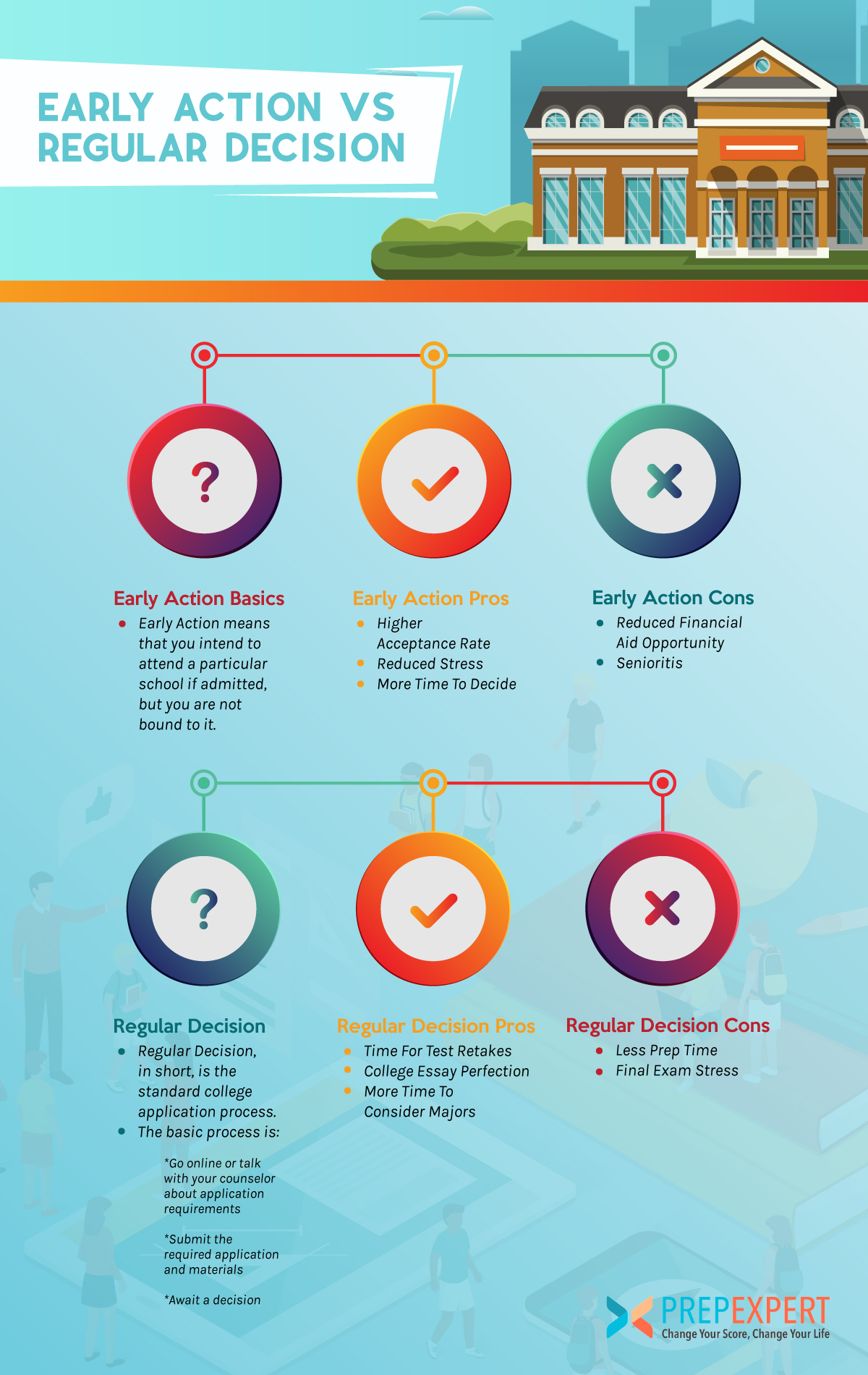Early Action Vs Regular Decision Pros And Cons
The college application process has various options when it comes to how early to submit your materials. One option students can use is Early Action, which is great for feeling the waters without making a commitment like Regular Decision.
Consider the pros and cons of early action vs regular decision before choosing your college application pathway.
Don’t forget to check out our various SAT prep and ACT prep courses available right now.
Early Action Basics
This option is great if you want a response without finalizing a commitment.
Early Action means that you intend to attend a particular school if admitted, but you are not bound to it. If you were going with Early Decision then you would have to commit to enrolling to that school.
Early Action Pros
Here are a few benefits of Early Action application:
Higher Acceptance Rates – Colleges like students who choose early action and early decision because it allows them to fill their upcoming classes earlier and easier.
Reduced Stress – While getting the application done early can be stressful, getting a decision far ahead of time provides peace of mind because you know you’ve already been accepted into one school for sure,
More Time To Decide – Getting an Early Action admittance means that you can take even more time to decide whether or not you want to attend, versus worrying if you could get in at all.
Early Action Cons
As with anything, Early Action has drawbacks to consider:
Reduced Financial Aid Opportunity – Students accepted through Early Action or Early Decision often have lower-value financial aid packages. One idea is that students who apply via this route tend to come from wealthier families.
As a result, their aid qualifications are affected. However, remember that the earlier you do apply, the better chance you have at receiving some aid because the school hasn’t exhausted its budget yet.
Senioritis – Students that receive Early Decision admission can easily fall into the trap of senioritis. Thinking that there’s nothing left to worry about, some seniors will let their final grades slip.
If your GPA significantly drops and your final transcript shows that you checked out, then you could easily lose your admission offer.
Going With Regular Decision
If you don’t want to hassle with early deadlines, then there’s always Regular Decision.
Regular Decision, in short, is the standard college application process. The basic process is:
- Go online or talk with your counselor about application requirements
- Submit the required materials
- Await a decision
Each school will have different deadlines to follow. You will also apply for financial aid by completing the FAFSA. From there, it’s simply a waiting game of either getting an acceptance or rejection letter.
Regular Decision Pros
Here are a couple of pros to consider:
Time For Test Retakes – If you’re trying to get your SAT or ACT scores as high as possible, then waiting to join the Regular Decision applicant pool isn’t a bad idea. You can have at least one or two tries to get scores up.
College Essay Perfection – In case you didn’t know, you have to write a lot of essays when applying to various colleges. The good part? You’ll likely be able to reuse what you’ve initially written a lot. It’s important to perfect that main essay as much as possible.
More Time To Consider Majors – Not sure what you want to study yet? That’s ok. Taking the time to consider different majors is a good idea before applying to schools, especially if they specialize in programs you aren’t interested in.
Regular Decision Cons
Don’t put off applications until you consider these possible drawbacks:
Less Prep Time – Chances are you may not hear until the following spring or end of senior year with Regular Decision. Graduation season can become very stressful.
Why? Because you know that after getting out of school, you may have only three months to prepare for a huge move and transition away from family.
Final Exam Stress – Unfortunately, not getting a decision until late spring can affect your AP exams and regular finals preparations. Those grades will count, so don’t let stress from looking ahead screw your focus up now.
For more test strategy, college admissions, and scholarship application tips sign up for our FREE class happening right now!
